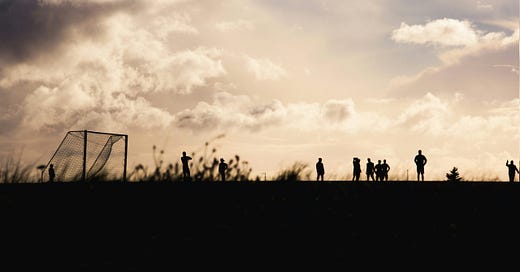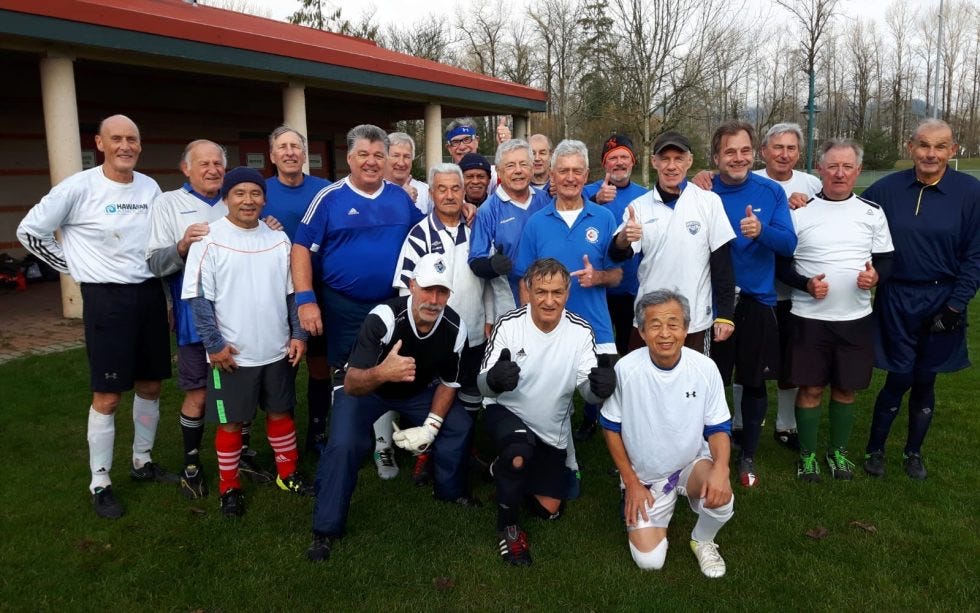Twice a week I do something dedicated to improving my physical. emotional, and mental health. The time I spend joining a club of 60+ guys playing soccer on Tuesday and Thursdays for a couple of hours is life-giving. For this group of older men age does not matter. We still get out and play and what I have learned is don’t believe the stereotypes about growing old.
Age is an issue of mind over matter. If you don’t mind it doesn’t matter.
Mark Twain
This motley crew of soccer players range in age from 60 years old to 81 years old. With a variety of body shapes and sizes we still believe that we have the skills, stamina, and self-confidence to participate in a life-long sport that brings great joy, laughter, and also sore bodies. And from the effort, attitude and commitment displayed we do well and play a pretty good level of soccer in my opinion.
Whether you are able to run or just walk, play for only thirty minutes or the whole game makes no difference. It is more than the physical exercise, it also provides a social experience that I find I need and the other members of the group say they need. Our bodies have deteriorated, injuries are common, but as Mark Twain says, “it doesn’t matter” because we still keep coming out.
I had been active in playing soccer for many years. But, as with most individuals, work, family, and community commitments got in the way of regularly committing to a fitness routine. It was not until I retired that I began to search for an activity that could improve my overall health and longevity. Fortunately for me, the old timers 60+ group came to the rescue.. At the age of 63, I discovered the group and it has been so beneficial.
One of the players is 78 year old.. He has very bad knees so he cannot run and has some trouble negotiating the field we play on. Yet, he plays and is not only a skillful contributor to the team, but a sassy one as well. He is not afraid of calling you out if you make a bad pass or give-away, and he always lets me know to go “back to defence Italia”, when I miss a shot on goal.
One day after a game he seemed dejected. I spoke to him as we were walking off the field and asked him what was bugging him. He said that he felt very frustrated during the game and he felt shame because he could not run, pass, or dribble the ball as he used to. At that time, he felt like giving up and he did not come to play for a while. But he did return about a month later and I told him how happy I was to see him. I also shared with him that I hope that when I am 78 I will have the same never- give-up attitude he displays each day he plays. I think all of the players demonstrate the same sentiment. We perservere in showing up to play regularly even though our knees, ankles, hamstrings, and back cry out in pain.
In retrospect, my teammates thoughts about giving up amplifies some of the typical stereotypes about ageing; frustration, guilt, shame, and discouragement for not being able to do what you could at a younger age. His expectations and his worry about not meeting the expectations of the other players is a classic illustration of ageing stereotypes and their prevalence in our culture and society.
Dr. Becca Levy in her book, Breaking the Age Code: How Your Beliefs About Aging Determine How Long and Well You Live, addresses the significance that ageing stereotypes have on individuals and society at large. She summarizes her findings after she began to explore, “the impact of cultural age stereotypes on the health and lives of older people.”
Among her fascinating conclusions is “that in study after study I conducted, I found that older people with more-positive perceptions of aging performed better physically and cognitively than those with more-negative perceptions; they were more likely to recover from severe disability, they remember better, they walked faster, and they even lived longer.” Dr. Levy goes on to share that the negative age stereotypes we hold can be changed and that her work provides, “an extraordinary opportunity to rethink what it means to grow old.”
Dr. Levy’s discoveries provide a ray of hope for the elderly. It certainly does for me, as it convinces me that I am, and my soccer teammates are on the right track. Finding something that brings you joy, positivity, and purpose like soccer does for us, can improve all aspects of your health and even increase your longevity. As I continue to age, I am so thankful that I discovered the soccer club.
Are you doing anything to shift your mindset? Don’t believe the stereotypes about growing old. Engage in activites that dispel ageing stereotypes. Find things to do that bring you contentment. As Dr. Levy is proving, the outcomes are so beneficial.
I challenge you to find and commit to something that changes yours and our cultures views on growing old.
“Just ’cause there’s snow on the roof doesn’t mean there’s not a fire inside.”
Bonnie Hunt





